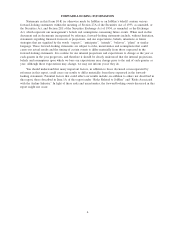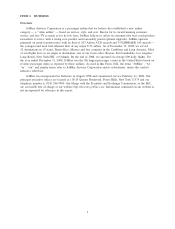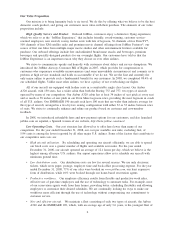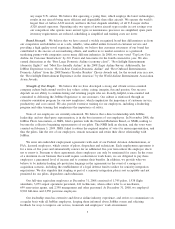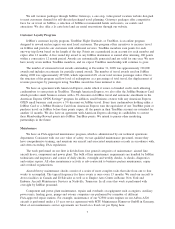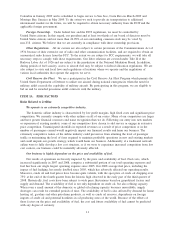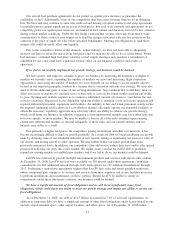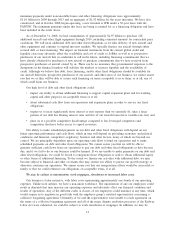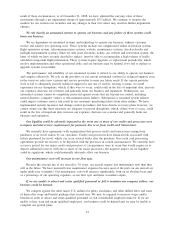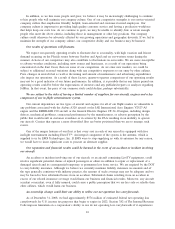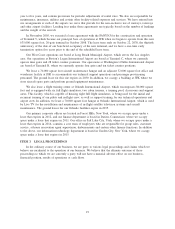JetBlue Airlines 2008 Annual Report Download - page 19
Download and view the complete annual report
Please find page 19 of the 2008 JetBlue Airlines annual report below. You can navigate through the pages in the report by either clicking on the pages listed below, or by using the keyword search tool below to find specific information within the annual report.difficulties was a 140% increase in the number of days ATC imposed ground delay programs were in effect at
JFK during July and August 2008 compared to the same period in 2007.
On October 10, 2008, the DOT issued its final Congestion Management Rule for JFK and Newark
International Airport. The rule contains caps on the number of scheduled operations that may be conducted
during specific hours and prohibits airlines from conducting operations during those hours without obtaining a
slot (authority to conduct a scheduled arrival or departure). In addition, the rule provides for the confiscation
of 10% of the slots over a five year period currently held by carriers and reallocates them through an auction
process. On December 8, 2008, the United States Court of Appeals for the District of Columbia issued an
order temporarily enjoining the auctions from taking place until such time as the Court could rule on the
merits of the case challenging the proposed auctions. We are participating in the litigation challenging the
rule, which if ultimately successful and the auctions are permitted to proceed, we would likely lose a portion
of our operating capacity at JFK, which would negatively impact our ability to fully utilize our new terminal
and may result in increased competition, which could harm our business.
At LaGuardia Airport, where we maintain a small presence, the High Density Rule was replaced by the
FAA with a temporary rule continuing the strict limitations on operations during the hours of 6:00 a.m. to
9:59 p.m. This rule had been scheduled to expire in late 2007 upon the enactment of a permanent rule
restructuring the rights of carriers to operate at LaGuardia. This final rule was issued in October 2008, but its
implementation has been partially stayed. Under the current rule, our operations remain unaffected. Should
new rules be implemented in whole or in part, our ability to maintain a full schedule at LaGuardia would
likely be impacted.
Long Beach (California) Municipal Airport is a slot-controlled airport as a result of a 1995 court
settlement. Under the settlement, there are a total of 41 daily non-commuter departure slots and a single slot is
required for every commercial departure. There are no plans to eliminate slot restrictions at the Long Beach
Municipal Airport. In April 2003, the FAA approved a settlement agreement among the City of Long Beach,
American Airlines, Alaska Airlines and JetBlue with respect to the allocation of the slots, which also provides
for a priority allocation procedure should supplemental slots above the 41 current slots become available. We
have 28 slots available for use and currently operate 30 weekday roundtrip flights from Long Beach Municipal
Airport to 14 domestic cities.
Environmental. We are subject to various federal, state and local laws relating to the protection of the
environment, including the discharge or disposal of materials and chemicals and the regulation of aircraft
noise, which are administered by numerous state and federal agencies.
The Airport Noise and Capacity Act of 1990 recognizes the right of airport operators with special noise
problems to implement local noise abatement procedures as long as those procedures do not interfere
unreasonably with the interstate and foreign commerce of the national air transportation system. Certain
airports, including San Diego and Long Beach, California, have established restrictions to limit noise, which
can include limits on the number of hourly or daily operations and the time of such operations. These
limitations serve to protect the local noise-sensitive communities surrounding the airport. Our scheduled flights
at Long Beach and San Diego are in compliance with the noise curfew limits, but when we experience
irregular operations, on occasion we violate these curfews. We have agreed to a payment structure with the
Long Beach City Prosecutor for any violations, which we pay quarterly to the Long Beach Public Library
Foundation and are based on the number of infractions in the preceding quarter. This local ordinance has not
had, and we believe that it will not have, a negative effect on our operations.
We have also published our initial corporate sustainability report, entitled the “1st Annual Environmental
and Social Report 2006,” which is available on our website, www.jetblue.com. The report addresses our
environmental efforts concerning greenhouse gas emissions, conservation efforts and social responsibility
initiatives.
Foreign Operations. International air transportation is subject to extensive government regulation. The
availability of international routes to U.S. carriers is regulated by treaties and related agreements between the
United States and foreign governments. We currently operate international service to The Bahamas, the
Dominican Republic, Bermuda, Aruba, the Netherlands Antilles and Mexico. JetBlue began service to Bogota,
10


